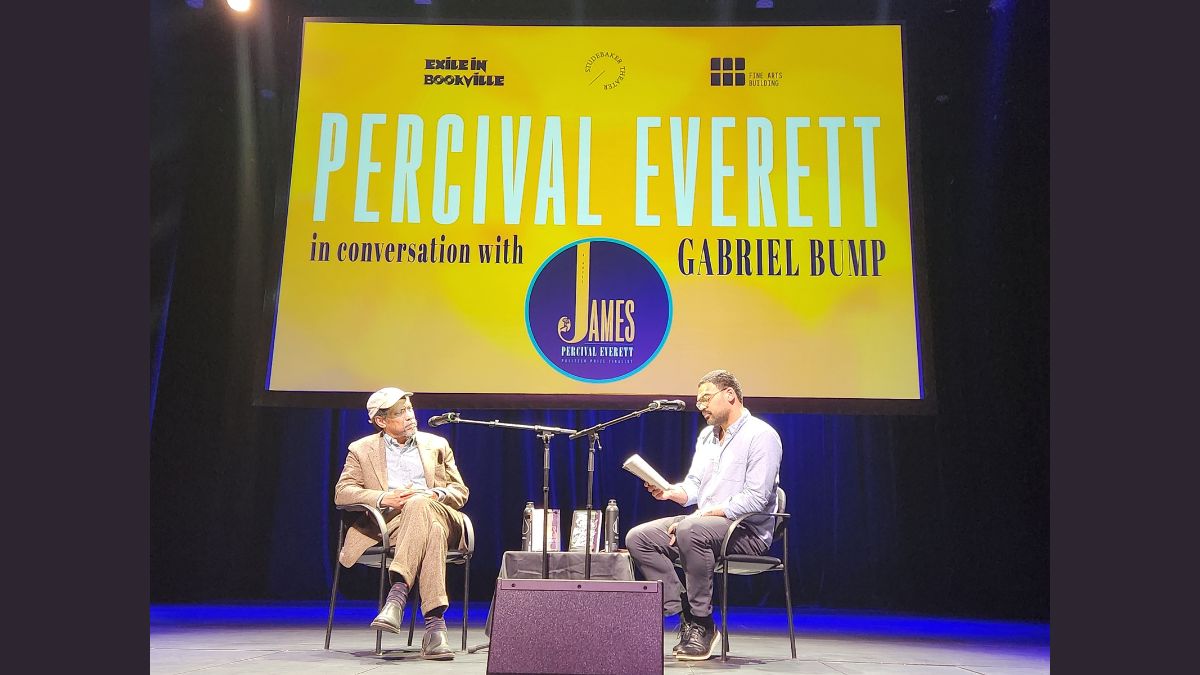When was the last time you immersed yourself in a book, captivated by its narrative, that provoked deep thought, whether for personal growth or simple leisure?
On Thursday, March 28, at 7 p.m., Exile in Bookville and the Historic Studebaker Theater welcomed a crowd eager to engage as Percival Everett, alongside author Gabriel Bump, delved into his latest novel, “James.”
A dynamic encounter unfolded as Everett met Bump, who was thrilled to engage with his literary idol while carving his path in the writing realm. The two men sat side by side before a packed audience, and their books were showcased in front of them.
In essence, “James” provides a contemporary perspective on a timeless narrative, emphasizing the main character’s humanity while showcasing Everett’s distinctive humor and depth of insight. This novel beckons readers to explore American literature from a lively and fascinating approach.
Everett and Bump engaged in an energetic discussion about their interpretations of “James.”
Everett asserted that the novel is a work of art, and its meaning is subjective, shaped by the reader’s perspective.
“It’s a novel, it’s a work of art. I can’t say what it means; it only means something once the reader comes to it. If you’re trying to write fiction solely to make a living, well, that’s ample evidence that I’m mentally deficient,” Everett said, causing the audience to laugh. “To turn to me for any message about life, I think a world will do what it does in that world. Depending on what they bring to it, readers will see many different things, and that’s the exciting part.”
Bump nodded in agreement before expressing his perspective on the novel.
I took away from James a better understanding of the history of race and humanity. In America, as you corrected, I took away one of the original sins of modern literature: the ending of Huck Finn, which turns into this weird slapstick game where Huck and Tom are playing on Jim. It fails the novel in a way.
“Well, that is where the novel fails,” he said. “Mark Twain stopped writing it for years and then returned to it. And a couple of things happened. One is he couldn’t find it again. More than likely, his money-making book was ‘Tom Sawyer.’ Twain was famously careful and tried to finish this book for capital, so the novel is broken. The first half of it is still as important as it is, but it falls apart with the reintroduction of Tom Sawyer.”
Gabriel and Everett delved into various topics during their dialogue, ranging from the origins of Everett’s career to discussions about his featured novel “James,” his experiences as a professor and the joys of life’s simple pleasures.
Everett said, “One of the things that has helped me in my career is that my agent has given me a lot of freedom. I’ve never had pressure to make money or to press my fingers firmly against the pulse of American popular culture.
“That’s clear from what I’ve chosen to publish. I want to double that, wherever you go, you work with people. I like people who are seamless in transition. My editor works pretty much the way my former editor did. I like the publicists, though they are slightly more passionate and insane. But it’s been a good experience.”
An audience member was curious about Percival’s thoughts about underrated authors, particularly Black authors, the ones he thinks more people should read or who have done a great job writing about the Black experience and deserve more attention.
Everett championed writer Chester Himes, recognizing his contributions.
When asked about teaching Western literature, Everett emphasized the need to address its problematic aspects while encouraging students to engage critically with the material. He stressed the importance of allowing students the freedom to laugh and find their meaning in literature.
Closing with reflections on the meaning of his work, Everett underscored the inherent subjectivity of art, rejecting the notion of a singular message. Instead, he celebrated the diverse interpretations that his novels inspire, finding excitement in the multitude of perspectives they evoke.
Beyond the confines of Chicago, Everett shared with the audience his favorite bookstore in the world.
“It used to be Powell’s Bookstore in Portland, Oregon. I haven’t visited in so long. There are some fantastic bookstores nationwide, like in LA and Seattle. There’s a bookstore in Los Angeles called Chevalier. The Strand in New York is excellent, too.”
Everett has undoubtedly been prolific in his writing. His stories have a unique power to influence and engage, and his ability to shape them is impressive.
